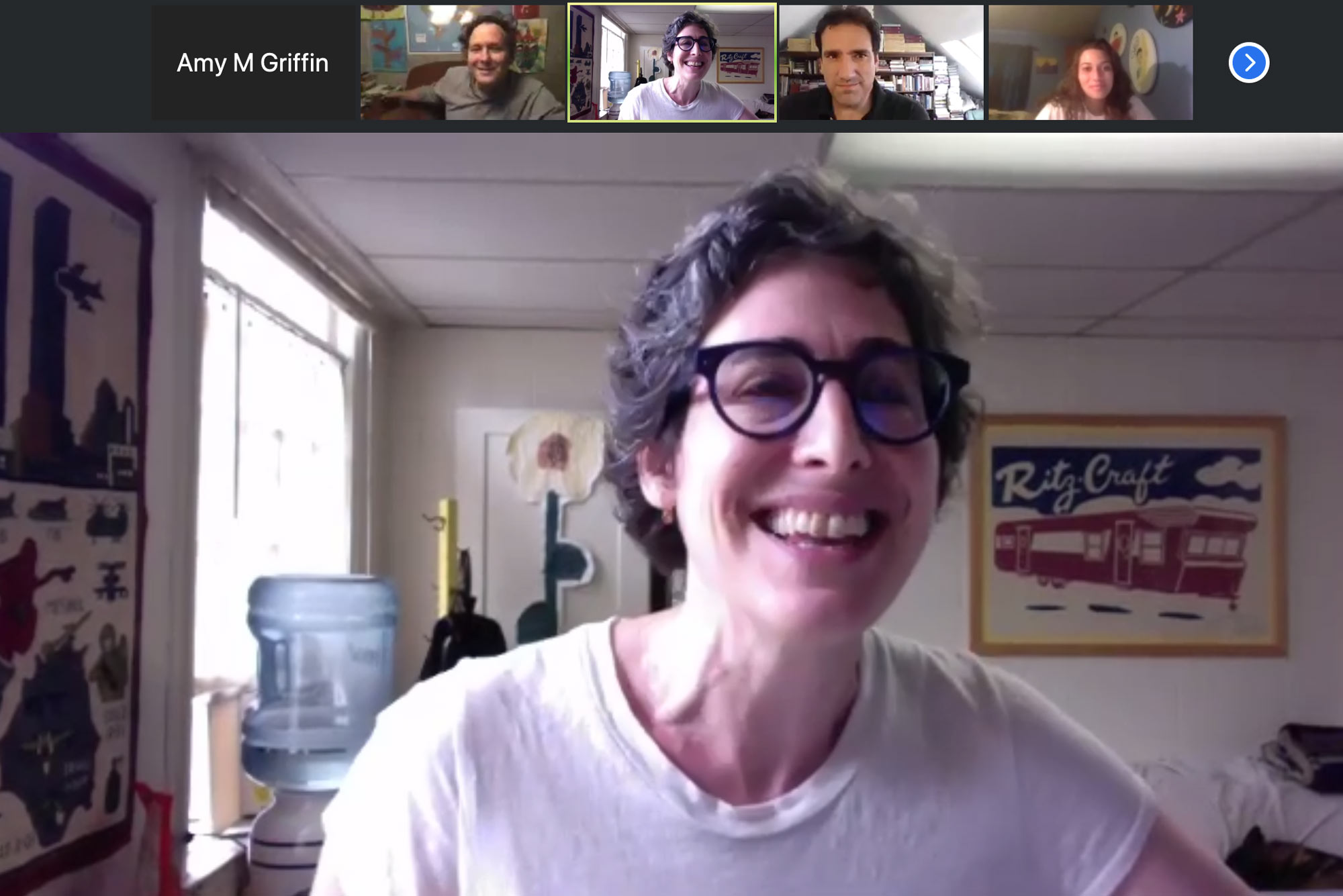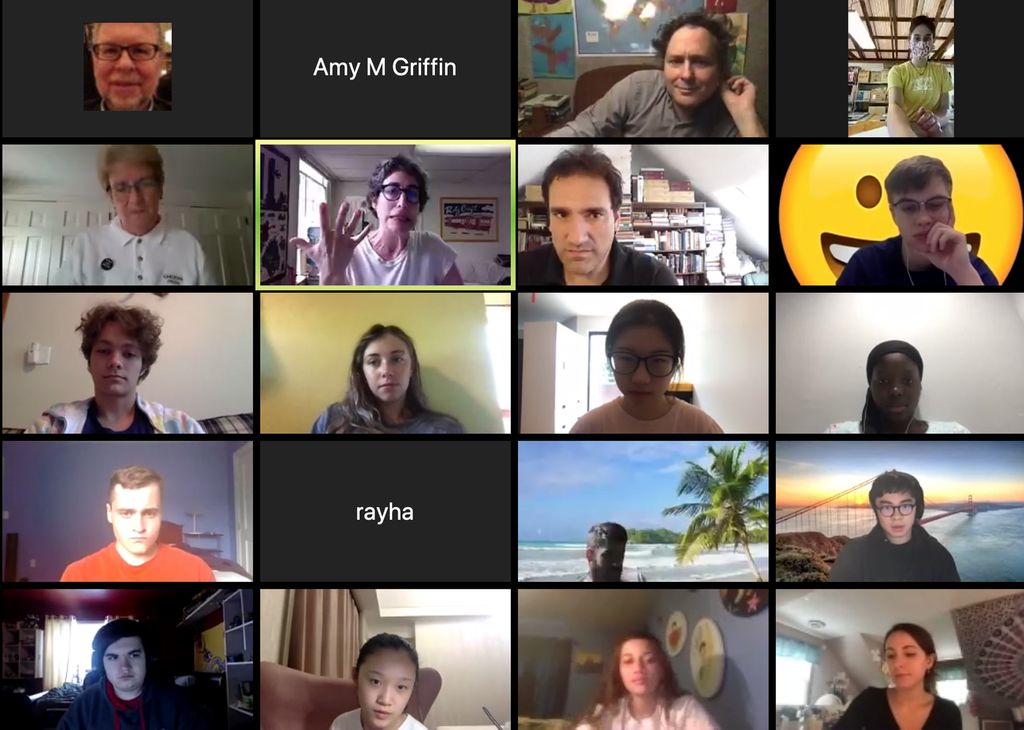Serial’s Sarah Koenig Virtually Visits with CGS Students

A screen grab of Sarah Koenig’s visit with College of General Studies students.
Serial’s Sarah Koenig Visits Virtually with CGS Freshmen
Podcast host chats about her craft, offers advice, and talks about her new show
If you’re interested in podcasting, who better to hear from than the cocreator and host of the mega hit Serial? Students in a College of General Studies freshman cohort, some of them working to create their own podcasts this summer, recently received a Zoom visit from Serial’s Sarah Koenig. The award-winning journalist dropped in to discuss her craft, talk about her new deal with the New York Times Company, and share some tips for students looking to create their own podcasts.
Her visit could be considered somewhat of a consolation prize—these freshmen were supposed to be studying this summer in London, but the trip was canceled because of the ongoing coronavirus pandemic. Aaron Worth, a CGS associate professor of rhetoric, one of the team of teachers scheduled to teach in London, and team members John Regan, a master lecturer in rhetoric, Richard Deese, a senior lecturer in social sciences, and Cheryl Boots, a senior lecturer in humanities, have instead spent the summer organizing experiential events, movie nights and chats, and more. The students are also listening to season three of Serial, and making connections between its subject matter and other assigned texts (like the Spike Lee film Do the Right Thing), as well as current events. Worth’s students will work later this semester on writing and producing their own podcasts.
Worth asked his longtime friend Koenig to visit the class. Serial started in 2014 with its investigation into the murder of Hae Min Lee, an 18-year-old high school student from Baltimore, and the subsequent arrest and trial of her classmate and ex-boyfriend Adnan Syed, who was charged in her death. Subsequent seasons dealt with an American soldier charged with desertion and with Cleveland’s criminal justice system. Serial, cocreated and coproduced by Koenig and Julie Snyder and developed by This American Life, has won every major broadcasting award, including the duPont-Columbia, Scripps Howard, Edward R. Murrow, and the first-ever Peabody awarded to a podcast. Its three seasons have been downloaded over 340 million times, an ongoing podcast world record.
On July 22, the New York Times Company announced that it was buying Serial Productions, the company that produces Serial, for about $25 million. Just last week, Serial Productions launched a new podcast, Nice White Parents, which examines how white parents influence the public school system. Koenig edited the new series.
BU Today was invited to listen in on the class, and below are some of the highlights from the class conversation, where professors and students asked questions.
Could Koenig comment on the evolving relationship between podcasts and more traditional media and whether podcasting will remain a medium where new ideas and intel can find an audience?
Koenig: We hope we can still be a place where we experiment and do weird stuff and try things, and kill stories that aren’t working, and all of that. That’s the spirit of the deal we just made, so I’m hoping that plays out. I think it’s concerning and a little scary when it feels like, oh, corporate America is swallowing up the little guy, and there goes the revolutionary spirit and stuff. That is a concern and I’m aware of it.
Her podcasts are obviously scripted and polished, but how does she manage to make them sound natural at the same time?
I wing nothing. I don’t know how to talk about what I do, except that I’ve been doing it a long time. When I listen back to my first radio show, which I almost never do, it’s so horrible. The script is horrible, I try to sound so soulful. At least I can say I’ve gotten better. It’s taken me a long time to learn how to write for radio, because I came from print. Our editing process is deep, painful, and long. I wrote a whole section for season three that didn’t even air. It took a long time, and then we killed it. I don’t even want to know the number of drafts. It was up into the 20s—it was awful.

How did she approach Serial’s third season, which focuses on Cleveland’s criminal justice system?
I had a lot of genuine questions about why does stuff work, the way it works. What I wanted to see and try to understand better was where are the fissures, cracks, and decision moments, where we can see it happening. I assume people go to work in the courthouse wanting to do the best they can, do the right thing. Obviously there are resource problems, etc. No one is in that business to make a lot of money. Getting the benefit of the doubt on one end, but then getting the hideous result on the other—how do you get from that to that? That’s what I was looking for, to see those decisions that seem so small, but they’re not. That little turn, which sets something on a whole different trajectory.
The first half of the series is: here’s how it works, the functioning of this building [the Justice Center Complex]. Then the second is going back out into the communities and neighborhoods that are affected by it, how does that work?
Would she ever consider following the case of Jeffrey Epstein, the American financier charged with sex trafficking, who is believed to have killed himself in jail last year?
We did consider it. Not so much for Serial, but another producer at This American Life looked into it. I think this was before New York announced it was going to indict. Once that happened, it kind of felt like, good, this is happening. A big question we have is, “Is there something we can bring to this that we want people to know?” If there are a billion eyes on something already, I don’t know if I’m better than people covering this already. I’m better than some, but not all.
I prefer to toil in obscurity for a while. People always ask me if I’m going to continue to cover the Adnan Syed story; it’s sort of like anytime there is the smallest court filing in that case, it’s international news at this point. I care about him and I care about the case, but in terms of our resources, let’s do something that’s not being covered super heavily. There are exceptions always.
What is she listening to and watching at the moment?
Jonathan Goldstein, creator of the podcast Heavyweight and a radio show called WireTap. I find him so funny and his writing so beautiful. I liked Hannah Gadsby’s two new shows on Netflix. I’m a big Ear Hustle fan; the show is based in San Quentin prison.
What is her take on how podcasts have become mainstream?
It’s weird to me that there is a conventional kind of podcasting now, because to me it still seems so new. But I do think there’s a familiarity with what a podcast is, how it sounds. There are certain kinds of conventions in this medium.
What advice does she have for students looking to break into the field?
What does it mean that bigger and bigger companies are getting involved in it? What that means is there are lots of jobs opening up. Or trainings opening up. Don’t be shy if you haven’t done this before, you can still send along things you’ve written and ideas you have.
It’s one of the few parts of journalism that is still expanding. If you’re really interested in making audio stories, try it on your own. I think what is great about podcasting is almost anyone can do it, though you may not have a million listeners. So many of us have phones and the internet. Record it and put it online…
You don’t need permission, you don’t need to be in someone’s office. The website Transom.org has really helpful tutorials and practical ideas of how to do things without fancy audio or software. I feel like if I was hiring at any kind of media company or newspaper, that’s what I would want to see. It’s, ‘I don’t have experience, but here are three, five-minute things I made. Here’s my voice and here’s what I’m interested in.’ That would be super impressive to me. Even if I didn’t have a job to offer you, you would be on my radar, and I would try to call someone, or help you out.

Comments & Discussion
Boston University moderates comments to facilitate an informed, substantive, civil conversation. Abusive, profane, self-promotional, misleading, incoherent or off-topic comments will be rejected. Moderators are staffed during regular business hours (EST) and can only accept comments written in English. Statistics or facts must include a citation or a link to the citation.